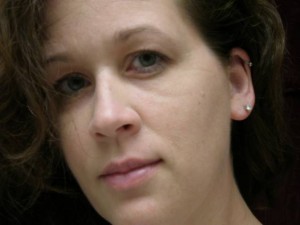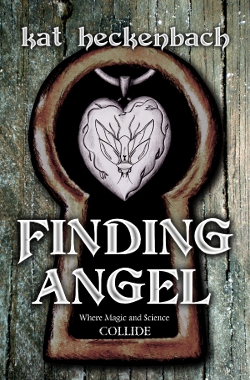I’d like to welcome Kat Heckenbach, author of the recently released Middle-Grade fantasy Finding Angel. Her writing spans the gamut from inspirational personal essays to dark and disturbing fantasy and horror, with over forty short fiction and nonfiction credits to her name. Finding Angel involves magic, an oft-debated subject among Christian authors and readers, which I asked Kat to address for us here.
* * *
 Most of us have heard about the debate among Christians regarding Harry Potter. One camp says Harry Potter is evil because it’s about “witchcraft” and leads people into the world of the occult. Parents ban their children from reading it. Pastors preach against it. They do this, of course, because the Bible says we are not to practice witchcraft or sorcery.
Most of us have heard about the debate among Christians regarding Harry Potter. One camp says Harry Potter is evil because it’s about “witchcraft” and leads people into the world of the occult. Parents ban their children from reading it. Pastors preach against it. They do this, of course, because the Bible says we are not to practice witchcraft or sorcery.
The other camp says Harry Potter is harmless. It isn’t “real” witchcraft, nor is it anything resembling occultism. Christians from this camp cite works like The Lord of the Rings and The Chronicles of Narnia—I’m assuming because Tolkien and Lewis are the two “big” names in fantasy who are known to be Christians.
I’m not here to debate Harry Potter. Yes, I’m a huge fan and I believe Rowling is a Christian. I am here to give my side of the story regarding magic in Christian fiction.
You see, I write fantasy. With magic. And I am a Christian.
To be honest, until Harry Potter came along I had no idea there were Christians who didn’t approve of fiction with magic. I grew up in the Bewitched generation, watching “Samantha” wiggle her nose to make objects fly across the room or disappear. I ran around the house trying so hard—and failing—to make my nose move like that. Another favorite of mine was I Dream of Jeannie. Hah—I could definitely cross my arms and nod! Of course I was pretending, and I knew the magic in those shows was the kind found in fairy tales.
Biblical magic—what the Bible refers to as witchcraft and sorcery—is an entirely different beast. The Bible warns us against trying to dip into a realm where we don’t belong. Summoning the dead or trying to gain access to the powers of demons. Those are things I can honestly call evil, and should never be given a positive light in Christian fiction.
I make a definitive distinction in my novel, Finding Angel, regarding that kind of magic vs. the fairy tale magic my characters possess. In the opening chapter  I mention Angel’s friend who uses Ouija boards and Tarot cards. Those activities distress Angel. She knows her friend is delving into dangerous territory. But Angel herself dreams constantly about fairy tale magic.
I mention Angel’s friend who uses Ouija boards and Tarot cards. Those activities distress Angel. She knows her friend is delving into dangerous territory. But Angel herself dreams constantly about fairy tale magic.
And when Angel discovers that the fairy tale magic she has dreamed of is real, it’s a bit of a surprise. It’s not just as easy as “think something you want” (or wiggle your nose) and “poof.” Physical rules govern the magic—such as conservation of matter. And the powers belonging to each character are innate, not attained by some ritual or spell book. There are no direct or overt references to God/Jesus/Christianity in Finding Angel, but the intent—and my readers so far have picked up on this—is that the characters’ powers are what could be termed “spiritual gifts.” Just like some people are gifted with artistic, intellectual, musical, or athletic ability, the characters in Finding Angel are gifted with such Talents as Gate-making, Finding, or Transforming (one substance into another).
My hope from the beginning was to show that magic does have a place in Christian fiction. I was tired of the debate, the nit-picking, the semantics dance between the two Christian camps. Those who say the use of the words “witch” and “wizard” are enough to imply occultism. I purposely avoided those words in my novel so the magic is what is being judged, not some arbitrary word for the people who have that magic.
And then my novel published.
Two good friends mentioned to me that they have serious issues with the whole “magic” thing. One even went as far as to say she would avoid books that include telepathy and telekinesis because those things are too close to magic for her. I have to admit I was stunned. I simply didn’t see the connection between thinking an object into motion and occultism. I still don’t.
The other friend is a huge Disney fan, so I asked her if she kept her daughters from watching Disney movies. Well, of course not! Hm, but what about Cinderella and her wand-wielding fairy godmother? Or Flora, Fauna, and Meriweather from Sleeping Beauty? Or Tinkerbell and her magic pixie dust? (However, I would have been in favor of banning Tinkerbell after watching the original Disney Peter Pan, because that little fairy was shallow and vindictive.) She said she’d actually never thought of that.
The whole issue, to me, has always boiled down to the difference between fairy tale magic and biblical magic. Biblical witchcraft, as I’ve pointed out, is about taking powers that don’t belong to us, from dark places. It involves spirits, other beings from the supernatural realm, and our attempt to use their powers or control them in order to bring about some desired result.
Fairy godmothers and pixies—as well as Samantha, and Jeannie, and Glinda the Good Witch from The Wizard of Oz—have magic which is an innate ability. (And where do innate abilities come from?) These abilities are like any other abilities and work within the confines of the world the characters live in, rather than from drawing from spirits or another realm.
My belief is this: Fairy tale magic totally has a place in Christian fiction when it’s about doing good with the gifts we are given. It’s about us being more than the sum of our parts, more than just these human bodies we inhabit. It points to the idea that there is more than this world, and when we think of the existence of something beyond the physical realm our minds naturally turn to thoughts of God—at least that is what happens for me.
All that said, I still told my two friends that if they felt uncomfortable reading my novel I would understand. I don’t believe in forcing anyone to read something that they feel will harm them spiritually. But both ladies said they would read it because *I* wrote it. I know one of them has already, and she told me the magic did not offend her. (Actually, she now says she wants very much to own a dragon, thanks to Finding Angel…)
It really is all in how you use the magic in your fiction—but then, isn’t that true of anything God gives us?
* * *
Thanks, Kat! And congratulations on your new release. To learn more about Kat Heckenbach, you can visit her website. Finding Angel is available at Amazon, Barnes and Noble, and Smashwords.















Just popping in again because I’m so happy to see the discussion continuing. I’ve noticed that many of the comments are reader to reader, so I’m not butting in on those, but wanted to say that I am reading the comments and enjoying the back and forth that is happening here!
I think this is a topic that will continue to have opposing sides within the Christian community. Actually, there are probably opposing opinions on the topic among those of no religious affiliation. So, I certainly didn’t expect to see a “resolution” of one side or the other, but am very grateful for being able to share my viewpoint and see so many people taking part in the discussion.
I am so glad you guys tried this, nothing could one of the characters in my my wip, mostly to help develop dialog .
Looks like someone new found our discussion. Thanks for stopping by, Jonathan! I appreciate the comments and support for my stance on this :). I particularly like your point about the use of stories like Harry Potter for illustrating to children the difference between “real” magic and fairy-tale/mechanical/made-up magic.
Very interesting conversation here, though it does make studying for a history test hard.
I’d have to agree with you about the difference between mechanical ‘magic’ (or, as we call it on Holy Worlds, cobha) and demonic magic, especially since I write more sci-fi than fantasy. I deal less with dragons and wizards and more along the lines of aliens and the occasional psionic. But I digress.
Magic, in the Bible, as I recall, does include a list of specifications that show the precise meaning of ‘magic’ which is to big of a term to use efficiently. Music can be described as magical, and so can be evenings, or sunsets. Are they really? No. They’re not, but they have a feel about them that transcends the mundane.
So I suppose it might just go back to observing the facets behind the outer word, like motivation, origin, and purpose.
Cool. (reaching for CJ Gosling’s The Guardian) Definitely want to hit the christian bookstore sometime soon and see what is being read!
This was a pretty rad write up since there is a HUGE amount of not only controversy but also a large theological ramification on Biblically ‘warned against’ magic, Fairytale magic, and then (imo) ‘magic’ that is actually being proven to simply be a manifestation of physical and neurological responses to and interaction with the world around us.
Anyway….basically there’s a lot here to discuss.
But I just was saying it was a good article and made me want to checkout more recent books.
(STILL WAITING FOR THE NEXT BOOK IN THE SHADOWLANDS SERIES!!!! LET’S GO, GOSLING! lol)